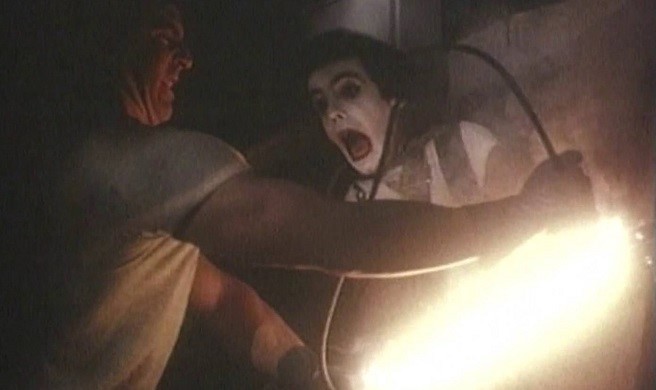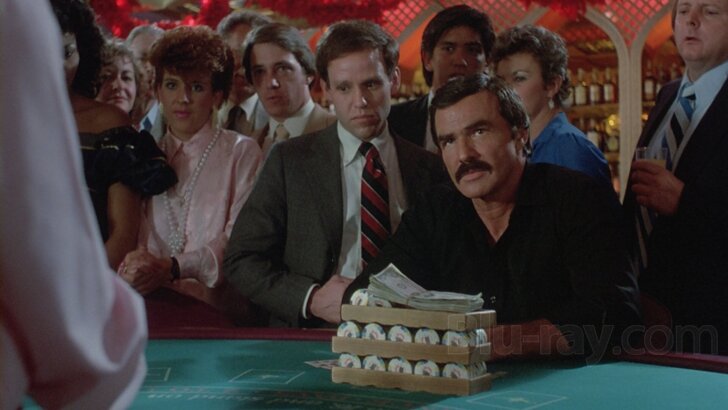(NO RATING)
Fruits of Passion (1981) Directed by Shūji Terayama
I don’t think there is a single actor who would feel entirely comfortable starring in a film that hands down boasts some of the most bizarre sex scenes ever, but there is, naturally, one infamous exception, and his name is kooky kinky Klaus Kinski. Indeed, Kinski is enthralled, utterly aroused playing Sir Stephens, a sleek, sleazy owner of an Oriental casino in 1920s China who consigns his beloved muse – or daughter? – to a flamboyant brothel to groom and fashion her to satisfy his most intrepid fetishes. Considering all the outrageous characters the irascible German actor has played in several films over the course of his career, his performance as Sir Stephens is just one over-the-top addition to the meta-psychological insanity of his persona. However, Kinski’s extravagant gusto in playing Sir Stephens, most notably in the aggressive, unsimulated sex sequences, unabashedly proclaims him to be the most Kinskian of all the characters he has ever played. Purely hypothetical, of course, but my intuition tells me there’s some veracity behind it.
Fruits of Passion directed by multifaceted Japanese avant-garde poet Shūji Terayama strikes me as an ignoble pretext to satiate Kinski’s twisted sexual fantasies in an experimental porno storytelling. Perhaps this is not entirely factual, and maybe Terayama genuinely meant to craft a wistful arthouse porno and not a Kinski-oriented affair, but let’s give him the benefit of the doubt and imagine that the goal was indeed to chronicle something meaningful under the poetic lens of motion pictures, if so, then this film is a woefully misunderstood, gorgeous imperfection of state-of-the-art world cinema. Fruits of Passion is supposed to be loosely based on the book Retour à Roissy, ostensible literary sequel to the S&M erotica of Story of O also penned by Anne Desclos, yet the film is too smug, aesthetically unruly to make a permanent creative commitment to follow through and settle once and for all what the hell it purports to be as a film adaptation. Perennially lingering in artistic limbo, the filmmakers have no alternative but to exploit the more lurid sides of the story. And from what can be appreciated superficially and fleshly, Klaus Kinski is more than content with that decision, he is in a trance-like hedonistic frenzy.
Isabelle Illiers plays O, Sir Stephens’ vulnerable and delicate muse, her petrified countenance and demeaning gestures convey gloom and misery rather than sensuality and eroticism, and her Kadavergehorsam performance – a German term meaning obedience unto death – is unfathomably disturbing. She is the very reason I decided not to rate this film, she looks downright uncomfortable in every scene where she must endure the grotesque sexual antics – she is naked in practically the entire film – and when she is performing next to Kinski, she appears truly aghast. Arielle Dombasle also has an explicit sex scene with Kinski – while Illiers is naked chained to a mirror watching them fucking – but she looks less mechanical than Illiers’ performance, so one might assume she had a marvelous time playing the sultry woman in the film, but she didn’t. Years later, the French actress said she repented acting in Terayama’s film; she also mentioned that Kinski was an insolent, irate creep who got off on exhibiting his sexual dominance towards others. But this is nothing unusual, right? Everyone is terrified of cinema’s biggest real-life boogeyman.
While all the sadomasochistic madness is happening in the seamy brothel, a local subversive group is mounting a major coup against the European establishment in Chinese society. This sort of subplot never gains momentum within the plot, but it adds dimension and poignancy in the midst of all the smut. But that’s not all, the heterogeneous storyline has the flashy contrivance of inserting a romance, which eventually unleashes the tragedy in Sir Stephens’ life and his rotten relationship with O. None of the subplots manage to mingle with the highly idiosyncratic nature of the depraved main plot, therefore they feel extraneous. What holds Fruits of Passion as an essential piece of world art cinema is its peculiar method of stirring up conflicting feelings through a luminous canvas of an abstract, chromatically irresolute and experimentally aggressive form that is accurate in rendering the sinuous perils of the idealization of totalitarianism and the fetishization of authority. Unclassifiable as it is unforgettable, Fruits of Passion may be as tastelessly autobiographical as it is mythical for Klaus Kinski’s nefarious reputation, but as far as a fictional pornographic illustration of his deplorable image as a human being and startling glorification as the truly gifted actor he was, this film is a powerful summation of his virtues and flaws, sins and vices.









